Translation Practice for Unit 4 西方文化读本翻译
- 格式:doc
- 大小:28.00 KB
- 文档页数:1
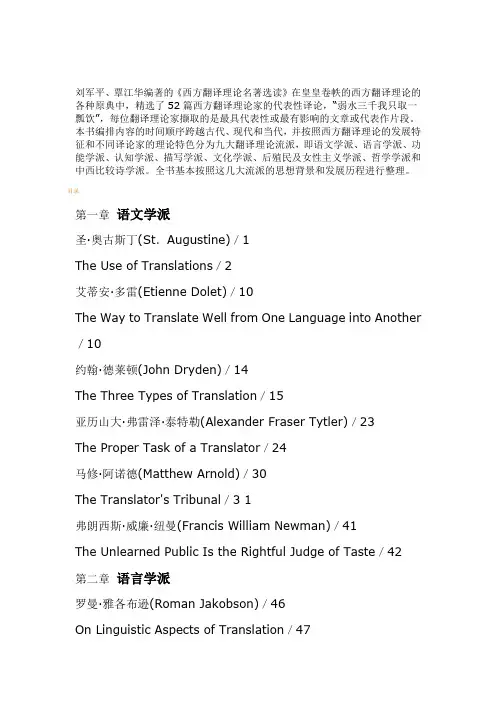
刘军平、覃江华编著的《西方翻译理论名著选读》在皇皇卷帙的西方翻译理论的各种原典中,精选了52篇西方翻译理论家的代表性译论,“弱水三千我只取一瓢饮”,每位翻译理论家撷取的是最具代表性或最有影响的文章或代表作片段。
本书编排内容的时间顺序跨越古代、现代和当代,并按照西方翻译理论的发展特征和不同译论家的理论特色分为九大翻译理论流派,即语文学派、语言学派、功能学派、认知学派、描写学派、文化学派、后殖民及女性主义学派、哲学学派和中西比较诗学派。
全书基本按照这几大流派的思想背景和发展历程进行整理。
目录第一章语文学派圣·奥古斯丁(St.Augustine)/1The Use of Translations/2艾蒂安·多雷(Etienne Dolet)/10The Way to Translate Well from One Language into Another/10约翰·德莱顿(John Dryden)/14The Three Types of Translation/15亚历山大·弗雷泽·泰特勒(Alexander Fraser Tytler)/23The Proper Task of a Translator/24马修·阿诺德(Matthew Arnold)/30The Translator's Tribunal/3 1弗朗西斯·威廉·纽曼(Francis William Newman)/41The Unlearned Public Is the Rightful Judge of Taste/42第二章语言学派罗曼·雅各布逊(Roman Jakobson)/46On Linguistic Aspects of Translation/47约翰·坎尼森·卡特福德(John Cunnison Catford)/54 Translation Shifts/55尤金·阿尔伯特·奈达(Eugene Albert Nida)/63Principles of Correspondence/64彼得·纽马克(Peter Newmark)/81Communicative and Semantic Translation/82奥伯利奇·纽伯特(Albrecht Neubert)/101Translation,Text,Translation Studies/102巴兹尔·哈蒂姆和伊恩·梅森(Basil Hatim&Ian Mason)/130 Pofiteness in Screen Translating/131第三章功能学派卡特琳娜·赖斯(Katharina Reiss)/149Type, Kind and Individuality of Text:Decision-making in Translation/150汉斯·约瑟夫·弗米尔(Hans Josef Vermeer)/163Skopos and Commission in Translational Action/164克里斯蒂安·诺德(Christiane Nord)/178A Functional Typology of Translations/179第四章认知学派厄恩斯特-奥古斯特·格特(Ernst-August Gutt)/202 Translation and Relevance/203罗杰·贝尔(Roger T.Bell)/225Translating,the Model/226丹尼·吉尔(Daniel Gile)/242The Effort Models in Interpretation/243第五章描写学派詹姆斯·斯特拉顿·霍姆斯(James Stratton Holmes)/268The Name and Nature ofTranslation Studies/269伊塔玛·埃文-佐哈尔(Itamar Even-Zohar)/282The Position of Translated Literature within the Literary Polysystem/283吉迪恩·图里(Gideon Toury)/289The Nature and Role of Norms in Translation/290莫娜·贝克(Mona Baker)/306Narratives in and of Translation/307安德鲁·切斯特曼(Andrew Chesterman)/318Memes of Translation/3 19西奥·赫曼斯(Theo Hermans)/332Translation's Other/333第六章文化学派安德烈·勒费弗尔(Andre Lefevere)/353Mother Courage's Cucumbers:Text,System and Refraction in a Theory of Literature/354苏珊·巴斯内特(Susan Bassnett)/375The Translation Turn in Cultural Studies/376劳伦斯·韦努蒂(Lawrence Venuti)/392The Formation of Cultural Identities/393埃德温·根茨勒(Edwin Gentzler)/415Translation,Poststructuralism,and Power/416迈克尔·克罗宁(Michael Cronin)/436History,Translation,Postcolonialism/437霍米·巴巴(Homi Bhabha)/454How Newness Enters the World:Postmodern Space, Postcolonial Times and the ri ftals of Cuhural Translation/455第七章后殖民及女性主义学派加亚特里·查克拉沃蒂·斯皮瓦克(Gayatri Chakravorty Spivak)/482The Politics of Translation/483道格拉斯·罗宾逊(Douglas Robinson)/507Posteolonial Studies, Translation Studies/508玛丽亚·铁木志科(Mafia Tymoczko)/528Translations of Themselves: the Contours of Postcolonial Fiction/529罗莉·张伯伦(Lori Chamberlain)/543Gender and the Metaphorics of Translation/544露易丝·冯·弗洛托(Luise yon Flotow)/562Gender and the Practice of Translation/563雪莉·西蒙(Sherry Simon)/582Taking Gendered Positions in Translation Theory/583第八章哲学学派弗里德里希·施莱尔马赫(Friedrich Schleiermacher)/610On the Different Methods of Translating/611弗里德里希·威廉·尼采(Friedfieh Wilhelm Nietzsche)/635 Translation as Conquest/636瓦尔特·本雅明(Walter Benjamin)/638The Task of the Translator/639雅克·德里达(Jacques Derrida)/649Des Tours de Babel/650威拉德·冯·奥曼·奎因(Willard Van Orman Quine)/682 Meaning and Translation/683汉斯-格奥尔格·伽达默尔(Hans—Georg Gadamer)/704 Language as the Medium of Hermeneutic Experience/705 乔治·斯坦纳(George Steiner)/725The Hermeneutie Motion/726保罗·利科(Paul Ricoeur)/732The Paradigm of TrarMation/733安东尼·皮姆(Anthony Pyrn)/746Translation Studies avd Western Philosophy/747第九章中西比较诗学派刘若愚(James J.Y.Liu)/767The Critic as Translator/768叶维廉(Wai—lim Yip)/781Ezra Pound's Cathay/782欧阳桢(Eugene Chen Eqyang)/807“Aaifices of Eternity”:Audiences for Translations of Chinese Literature/808宇文所安(Stephen Owen)/822A Note on Translation/823厄内斯特·弗朗西斯科·费诺罗萨(Ernest Francisco Fenollosa)/830The Chinese Written Character as a Medium for Poetry/831 马悦然(Gfiran Malmqvist)/851On the R01e of the Translator/852葛浩文(Howard Goldblatt)/862Why I Hate Arthur Waley?Translating Chinese in aPost-Victorian Era/863参考文献。

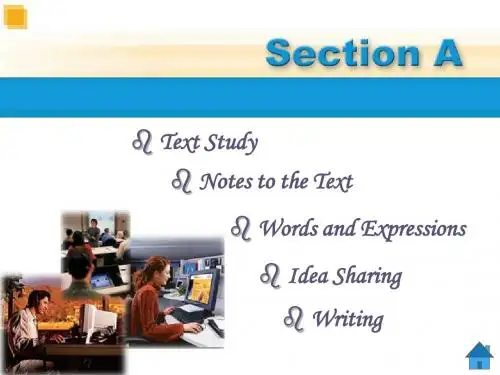

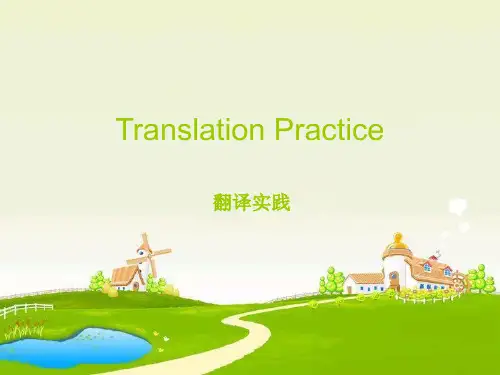
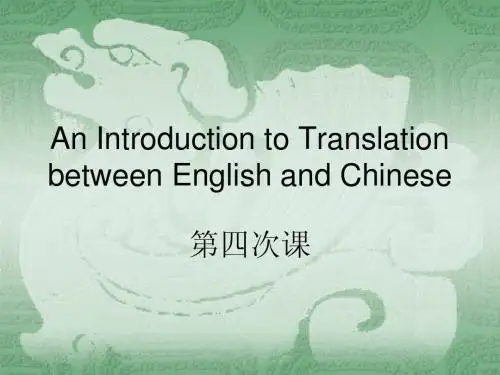
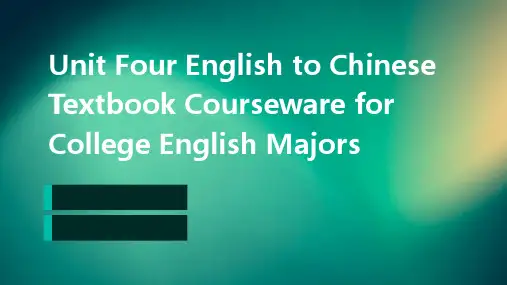
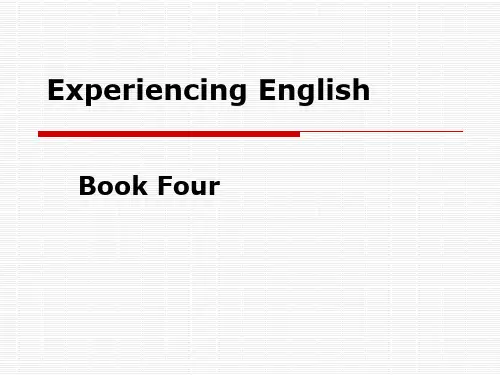
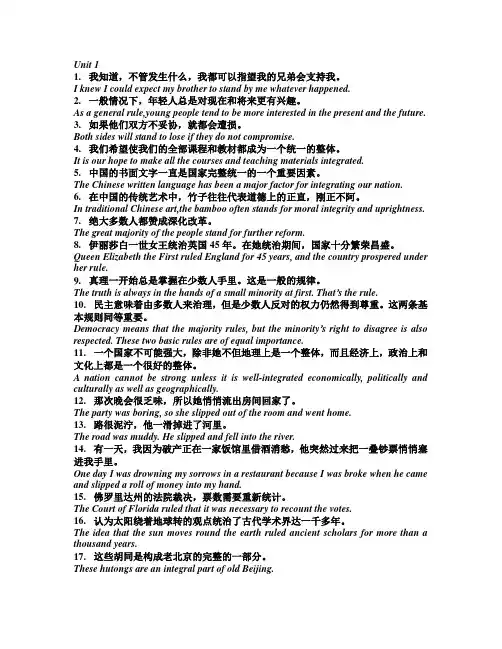
Unit 11.我知道,不管发生什么,我都可以指望我的兄弟会支持我。
I knew I could expect my brother to stand by me whatever happened.2.一般情况下,年轻人总是对现在和将来更有兴趣。
As a general rule,young people tend to be more interested in the present and the future.3.如果他们双方不妥协,就都会遭损。
Both sides will stand to lose if they do not compromise.4.我们希望使我们的全部课程和教材都成为一个统一的整体。
It is our hope to make all the courses and teaching materials integrated.5.中国的书面文字一直是国家完整统一的一个重要因素。
The Chinese written language has been a major factor for integrating our nation.6.在中国的传统艺术中,竹子往往代表道德上的正直,刚正不阿。
In traditional Chinese art,the bamboo often stands for moral integrity and uprightness.7.绝大多数人都赞成深化改革。
The great majority of the people stand for further reform.8.伊丽莎白一世女王统治英国45年。
在她统治期间,国家十分繁荣昌盛。
Queen Elizabeth the First ruled England for 45 years, and the country prospered under her rule.9.真理一开始总是掌握在少数人手里。
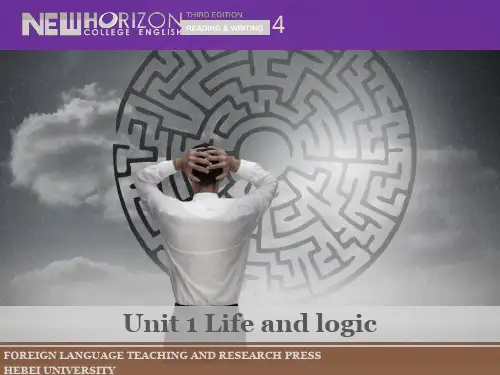
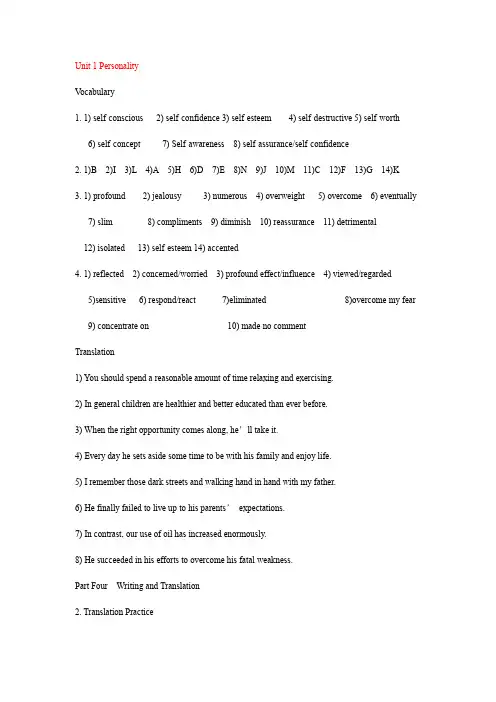
Unit 1 PersonalityV ocabulary1. 1) self-conscious 2) self-confidence 3) self-esteem 4) self-destructive 5) self-worth6) self-concept 7) Self-awareness 8) self-assurance/self-confidence2. 1)B 2)I 3)L 4)A 5)H 6)D 7)E 8)N 9)J 10)M 11)C 12)F 13)G 14)K3. 1) profound 2) jealousy 3) numerous 4) overweight 5) overcome 6) eventually7) slim 8) compliments 9) diminish 10) reassurance 11) detrimental12) isolated 13) self-esteem 14) accented4. 1) reflected 2) concerned/worried 3) profound effect/influence 4) viewed/regarded5)sensitive 6) respond/react 7)eliminated 8)overcome my fear9) concentrate on 10) made no commentTranslation1) You should spend a reasonable amount of time relaxing and exercising.2) In general children are healthier and better educated than ever before.3) When the right opportunity comes along, he’ll take it.4) Every day he sets aside some time to be with his family and enjoy life.5) I remember those dark streets and walking hand in hand with my father.6) He finally failed to live up to his parents’expectations.7) In contrast, our use of oil has increased enormously.8) He succeeded in his efforts to overcome his fatal weakness.Part Four Writing and Translation2. Translation Practice1) It is believed that pessimism often leads to hopelessness, sickness and failure.2) Optimism, by contrast, can make you happy, healthy and successful.3) When you fail in something, profit from the failure as a learning experience.4) Think about your strengths and build up self-confidence in front of problems or difficulties.5) Don’t let negative thoughts hold you back.6) Everyone has experienced failures and disappointments, so don’t blame yourself too much.Unit 2 Myths and LegendsV ocabulary1. 1) A. invitation B. invited C. inviting 2) A. prepare B. prepared C. preparation D. preparatory/preparation3) A. discoveries B. discoverers C. discovered4) A. approval B. approve C. approved D. approving E. disapprove5) A. eloquent B. eloquence C. eloquently6) A. faithful B. unfaithful/faithless C. faith d. faithfully7) A. occasional B. occasionally C. occasion8) A. delivery B. delivering C. delivered9) A. troublesome B. troubled C. troubled D. troubling 10) A. assurance B. assured C. assure2. 1) got/ran into trouble 2) no trouble 3) asking for trouble 4) have …trouble 5) troublewith6) in serious/deep/big trouble 7) get/getting …into trouble 8) took the trouble3. 1) with a pattern of roses 2) prepared a wonderful/goof meal for us3) promised faithfully 4) deliver this letter5) a selection of milk and plain chocolate 6) keep out of mischief/behave themselves7) the sound of distant thunder 8) received approval from the government9) in spite of the fact that he drank too much 10) agree whether the drug is safe or notPart Three Further Development5. Complete the following Ancient Chinese story by translating the Chinese into English1) the true reason why there was no such animal in Guizhou2) they were of no use at all in this place3) when he saw the donkey all of a sudden, he thought it was a monster4) he hid himself in the trees while looking at the donkey5) what kind of animal is this and why does it look different from other animals that I’ve seen?6) But one day the donkey stretched its thin neck and cried7) the tiger discovered that the donkey didn’t have any other skills besides crying8) But he dared not rush to it and eat it just as he did to other animals9) This did irritate the donkey (made the donkey angry), who raised its hind leg and kicked the tiger10) This time he rushed to it without hesitation and bit its rhroatPart Four Writing and Translation2. Translation Practice万物之初天地还是一体充满混沌。
新视野大学英语(第二版)读写教程第四册课文翻译(最新完整版)Unit 1section A名气之尾艺术家追求成名,如同狗自逐其尾,一旦追到手,除了继续追逐不知还能做些什么。
成功之残酷正在于它常常让那些追逐成功者自寻毁灭。
对一名正努力追求成功并刚刚崭露头角的艺术家,其亲朋常常会建议“正经的饭碗不能丢!”他们的担心不无道理。
追求出人头地,最乐观地说也困难重重,许多人到最后即使不是穷困潦倒,也是几近精神崩溃。
尽管如此,希望赢得追星族追捧和同行赞扬之类的不太纯洁的动机却在激励着他们向前。
享受成功的无上光荣,这种诱惑不是能轻易抵挡的。
成名者之所以成名,大多是因为发挥了自己在歌唱、舞蹈、绘画或写作等方面的特长,并能形成自己的风格。
为了能迅速走红,代理人会极力吹捧他们这种风格。
他们青云直上的过程让人看不清楚。
他们究竟是怎么成功的,大多数人也都说不上来。
尽管如此,艺术家仍然不能闲下来。
若表演者、画家或作家感到无聊,他们的作品就难以继续保持以前的吸引力,也就难以保持公众的注意力。
公众的热情消磨以后,就会去追捧下一个走红的人。
有些艺术家为了不落伍,会对他们的写作、跳舞或唱歌的风格稍加变动,但这将冒极大的失宠的危险。
公众对于他们藉以成名的艺术风格以外的任何形式都将不屑一顾。
知名作家的文风一眼就能看出来,如田纳西·威廉斯的戏剧、欧内斯特·海明威的情节安排、罗伯特·弗罗斯特或T.S.艾略特的诗歌等。
同样,像莫奈、雷诺阿、达利这样的画家,希区柯克、费里尼、斯皮尔伯格、陈凯歌或张艺谋这样的电影制作人也是如此。
他们鲜明独特的艺术风格标志着与别人不同的艺术形式上的重大变革,这让他们名利双收,但也让他们付出了代价,那就是失去了用其他风格或形式表现自我的自由。
名气这盏聚光灯可比热带丛林还要炙热。
骗局很快会被揭穿,过多的关注带来的压力会让大多数人难以承受。
它让你失去自我。
你必须是公众认可的那个你,而不是真实的你或是可能的你。
新视野大学英语(第三版)第四册读写教程答案Unit 1Text AText A: Language focus: Words in usecrumbleddiscernsurpassshrewdconversiondistortradiantingeniousstumpedpropositionText A: Language focus: Word building: Practice 1 delicacybankruptcyaccountancysecrecyvacancyurgencyatmosphericmagnetmetallicgloomguiltmasteryText A: Language focus: Word building: Practice 2 bankruptciesatmosphericdelicaciesurgencyaccountancygloommagnetmetallicmasteryvacancyguiltsecrecyText A: Language focus: Banked clozementioneddeterminegainedresponsibleheavilyartisticoppositeanalyticaldistortedstumpedText A: Language focus: Expressions in usewere dripping within exchange forflared upmake an analogy betweenset a date formake……out ofmade a pacthad appealed toText AiTranslation: Task 1亚里士多德是古希腊的哲学家和科学家。
他的作品涵盖了许多学科,包括物理学、生物学、动物学、逻辑学、伦理学、诗歌、戏剧、音乐、语言学、政治和政府,构成了第一个综合的西方哲学体系。
---------------------------------------------------------------最新资料推荐------------------------------------------------------ 新编大学英语第三版综合教程第四册课后答案Unit 1 PersonalityVocabulary1. 1) self-conscious 2) self-confidence 3) self-esteem 4) self-destructive 5) self-worth6) self-concept 7) Self-awareness 8) self-assurance/self-confidence2. 1)B 2)I 3)L 4)A 5)H 6)D 7)E 8)N 9)J 10)M 11)C 12)F 13)G 14)K3. 1) profound 2) jealousy 3) numerous 4) overweight 5) overcome 6) eventually7) slim8) compliments 9) diminish 10) reassurance 11) detrimental12) isolated 13) self-esteem 14) accented4. 1) reflected 2) concerned/worried 3) profound effect/influence 4) viewed/regarded5)sensitive 6) respond/react7)eliminated8)overcome my fear9) concentrate on10) made no commentTranslation1) You should spend a reasonable amount of time relaxing and exercising.2) In general children are healthier and better educated than ever before.3) When the right opportunity comes along, he’ll take it.4) Every day he sets aside some time to be with his family and enjoy life.5) I remember those dark streets and walking hand in hand with my father. 6) He finally failed to live up to his parents’expectations.7) In contrast, our use of oil has increased enormously.8) He succeeded in his efforts to overcome his fatal1/ 18weakness.Part Four Writing and Translation2. Translation Practice---------------------------------------------------------------最新资料推荐------------------------------------------------------ 1) It is believed that pessimism often leads to hopelessness, sickness and failure. 2) Optimism, by contrast, can make you happy, healthy and successful. 3) When you fail in something, profit from the failure as a learning experience. 4) Think about your strengths and build up self-confidence in front of problems or difficulties. 5) Don’t let negative thoughts hold you back. 6) Everyone has experienced failures and disappointments, so don’t blame yourself too much.Unit 2 Myths and LegendsVocabulary1. 1) A. invitation B. invited C. inviting2) A. prepare B. prepared C. preparationD.preparatory/preparation3) A. discoveries B. discoverers C. discovered4) A. approval B. approve C. approved D. approvingE. disapprove5) A. eloquent B. eloquence C. eloquently6) A. faithful B. unfaithful/faithless C. faithd. faithfully7) A. occasional B. occasionallyC. occasion8) A. delivery B. delivering C. delivered9) A. troublesome B. troubled assured C. assureC. troubledD. troubling 10) A. assurance B.2. 1) got/ran into trouble trouble2) no trouble3) asking for trouble 4) h ave … trouble 5)with6) in serious/deep/big trouble 7) get/getting … into trouble 8) took the trouble3/ 183. 1) with a pattern of roses2) prepared a wonderful/goof meal for us3) promised faithfully4) deliver this letter5) a selection of milk and plain chocolate 6) keep out of mischief/behave themselves7) the sound of distant thunder8) received approval from the government9) in spite of the fact that he drank too much 10) agree whether the drug is safe or notPart Three Further Development5. Complete the following Ancient Chinese story by translating the Chinese into English1) the true reason why there was no such animal in Guizhou2) they were of no use at all in this place3) when he saw the donkey all of a sudden, he thought it was a monster4) he hid himself in the trees while looking at the donkey 5) what kind of animal is this and why does it look different from other animals that I’ve seen?6) But one day the donkey stretched its thin neck and cried 7) the tiger discovered that the donkey didn’t have any other skills besides crying8) But he dared not rush to it and eat it just as he did to other animals9) This did irritate the donkey (made the donkey angry), who raised its hind leg and kicked thetiger10) This time he rushed to it without hesitation and bit its rhroatPart Four Writing and Translation2. Translation Practice万八---------------------------------------------------------------最新资料推荐------------------------------------------------------一起。
在生活中,没有什么比顿悟更令人激动和兴奋的,它可以改变一个人---------不仅仅是改变,而且变得更好。
当然,这种顿悟是很罕见的,但仍然可以发生在我们所有人身上。
它有时来自一本书,一个说教或一行诗歌,有时也来自一个朋友。
在曼哈顿一个寒冷的冬天下午,我坐在一个法国小餐馆,倍感失落和压抑。
因为几次误算,在我生命中一个至关重要的项目就这样落空了。
就因为这样,甚至连期望看到一个老朋友(我常常私下亲切的想到的一个老人)的情形都不像以前那样令我兴奋。
我坐在桌边,皱起眉头看着色彩多样的桌布,清醒地嚼着苦涩的食物。
他穿过街道,过着旧棉袄,一顶帽子从光头打下来,看上去不像是一个有名的精神病医生,倒像是一个精力充沛的侏儒。
他的办公室在附近到处都有,我知道他刚刚离开他最后一个病人。
他接近80岁,但仍然扛着一个装着满满文件的公文包,工作起来仍然像一个大公司的主管,无论何时有空,他都仍然爱去高尔夫球场。
当他走过来坐在我旁边时,服务员早已把他总是要喝的啤酒端了过来。
我已经几个月没有见他了,但他似乎还是老样子。
没有任何寒暄,他就问我“怎么了,年轻人?”我已经不再对他的样子感到奇怪,所以我详细地把烦恼告诉他。
带着一丝忧伤的自豪,我尽量说出实情,除了我自己,我并没有因为失望而责备任何人。
我分析了整件事情,但所有负面评价以及错误仍然继续。
我降了约有十分钟,这期间老人只是默默的喝着啤酒。
我讲完后,他取下眼镜说:“到我的办公室去。
”“到你的办公室?你忘了带什么了吗?”他和蔼的说“不是,我想看看你对某些事情的反应,仅此而已。
”外面开始下起小雨,但他的办公室很温暖,舒服,亲切:放满书的书架靠着墙壁,长皮沙发Sigmund佛洛依德的亲笔签名照,还有墙边放着的录音笔。
他的秘书已经回家了,只有我们在那里。
老人从纸盒里拿出一盘磁带放进录音笔,然后说:“这里面有到我这里来求助的三个人的简单录音,当然,这没有说明具体是那三个人。
我想让你听听,看你是否能找出双字词的短语,这里是在三个案例中共有的。
课程名称:大学英语读写课授课对象:二年级全校公共课学生授课教师:职称:教材版本:《新视野大学英语﹒读写教程》第四册参考资料:教学光盘,教学参考书(外语教学与研究出版社)教学方法:计算机辅助多媒体教学手段授课。
(大班上课,小班辅导,上机自主学习)交际法与翻译法。
教学周次:4x18教学手段:多媒体教室,电子备课材料(移动硬盘),教材教学目标及要求:1.掌握每一单元的Section A中心思想、了解篇章结构,写作特点、文化背景知识。
2.掌握并背诵每一单元的Section A的核心词汇和短语、核心句型。
并能举一反三,熟练运用。
写出较通顺的短文。
3.自学Section B 和Section C 的内容。
4.课后自己做《新视野大学英语﹒综合练习》第四册Unit One (Book Four)Content of the CourseSection A. The Temptation of a Respectable Woman (精讲)Section B. The Obligations and Responsibilities to Marriage(略讲)Section C. The Positive Meanings of Love (泛读)AudienceTeaching Span6-7学时Teaching Aims1.Appreciate the text to know sth. about what happened between Mrs. Barodaand her husband’s friend.2. Learn to use some important words, expressions and sentence patterns.3. Practice listening, speaking, reading and writing.4. Learn some translation skillsInstruction Objectives &. Teaching ProceduresStep One Pre-reading Activities (导入)文章主题(Themes)10 minutes课文A向我们讲述了一位女性与她丈夫的一位生性沉默的朋友一起度过的一段时间,描写了她对这位朋友在感情上发生的变化。
Translation Practice for Unit 4
Directions: Translate the following passages into English.
1)中国古代教育在中国文化中起着举足轻重的作用。
中国古代教育最早可以追溯到周朝中后期诸子百家的教育思想。
古代中国的教育给人们提供了一个平等的发展机会,即使出身贫寒的人也有可能步入仕途。
春秋时期,伟大的教育家孔子打破“学在官府”的陈规。
私人学堂盛行。
不同的学派通过学堂传播他们的思想主张,出现了百家争鸣的局面。
2)孔子既是教育家又是哲学家。
他的思想理论规范影响着人们的伦理、道德、生活等方方面面。
孔子思想的特征之一是他十分强调教育与学习。
在思与学的关系上,他认为学思并重。
他认为,“学而不思则罔,思而不学则殆。
”对孔子来说,道德教育是最重要的。